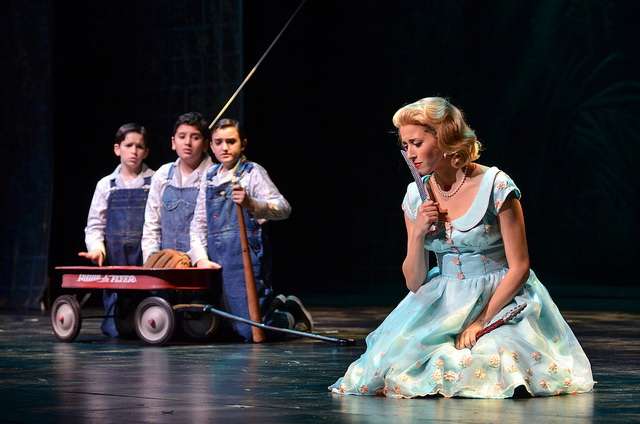|
Back
Winter Dreams, Give Me More, Give Me More Miami
Adrienne Arsht Center for the Performing Arts
01/26/2013 - & February 1, 5, 10, 13, 2013
Wolfgang Amadeus Mozart: Die Zauberflöte, K. 620
Andrew Bidlack (Tamino), Jonathan G. Michie (Papageno), Lisette Oropesa (Pamina), Jeanette Vecchione (Queen of the Night), Jordan Bisch (Sarastro), Adam Lau (Speaker), Matthew Maness (Monostatos), Lacey Sauter (First Lady), Hye Jung Lee (Papagena)
Florida Grand Opera Orchestra and Chorus, John Keene (chorus master), Andrew Bisantz (conductor)
Jeffrey Marc Buchman (director), Thierry Bosquet (scenic & costume designs), Donald Edmund Thomas (lighting design), Rosa Mercedes (choreography)

L. Oropesa (Courtesy of MGO)
Often people think that attending The Magic Flute means a cheerful and enjoyable evening. And they also figure that kids are going to love it. When examining just the “spiel,” usually one is let down for a few reasons: first, it is too long, second, it just isn’t funny and last, it doesn’t even make sense. “Oh, but it is a fairytale!” acolytes will say, as if interesting characters and logic are not necessary. But James M. Barrie, the brothers Grimm, Horatio Alger and Richard Wagner would have been insulted had audiences expected so little from their plays, stories and librettos. A fairytale requires not only great imagination but must offer something for which we feel it is worthwhile to suspend our disbelief. So for those of us who do not enjoy Flute's libretto, it is best to concentrate only on the musical values; and with this opera there is a goldmine.
The greatest thing about this opera is the stunning simplicity of the music. Of course simple things are usually not so simple at all, anything but; the great artists make it look easy. Take any one of the songs and remove its words; because we have a genius, the music alone creates the drama and characterization. It is almost frightening to imagine what this work would have been with a libretto of equal caliber.
But Florida Grand Opera offers an approach that could probably not be more fun, more charming, and more able to remove that cloud of tedium that so often creeps in. It is such a simple idea that it is surprising someone didn't conceptualize it this way a long time ago. Basically, Tamino and his little brothers are being raised by a single father. One night Dad brings his oldest son a book titled, “The Magic Flute.” Tamino turns out the light so his father won't know he is reading by flashlight. He falls asleep and the story takes over. Sounds pretty trite, but it offers a wealth of opportunity for designers, performers and choreographer. When the singing is also, for the most part solid, and the conductor shows tenderness and understanding of the music, even people who once disliked this opera will do some rethinking.
But the music, and the singing, is why we came. A great physical production without them has no purpose. The greatest success is that the three main roles were all sung and performed beautifully. Andrew Bidlack is an exceptionally confident Tamino. Maybe he is a little too old (what singer wouldn't be) for the concept, but he plays along making it completely believable. And the sound he makes for some of Mozart's most beautiful tenor arias is simply stunning: tender and never forced. The same for Lisette Oropesa's Pamina. With all the silliness going on, Pamina's relevance is sometimes diminished. Not this time. Pamina is a pretty headstrong girl, costumed to resemble Leslie Gore, who seems to be telling Monostatos, “Don't tell me what to do!” Her only fear is in losing the man she loves. Her “Ach ich fuhls” is beyond heartfelt. It is almost a tragic moment where we truly feel for this poor young woman. And she nails the subtle coloratura that only the best can make memorable. There are obviously overtones of Sandy Dombrowski feeling rejected by Danny Zuko. And of course Papageno who is, in truth, the one who makes or breaks any Flute. Jonathan G. Michie is the evening's over the top banana but with such a glorious instrument he gives much more than burlesque comedy. With his 1950's pompadour hairstyle “Der Vogelfänger bin ich ja” shows a guy as dedicated to his work as a grease monkey. “Ein Mädchen oder Weibchen” might show a bit of a goofy Papageno but he is never stupid. And his tone, pitch and volume are spot on perfect. As Michie showed in his performance as Masetto a couple seasons back, he is a natural scene stealer. He does not upstage; he just has the presence to make certain that all others are performing at their peak or they will be dwarfed.
Jeanette Vecchione's Queen and surprisingly Jordan Bisch's Sarastro were too lightweight to be playing with this ensemble. The Speaker of Adam Lau and Matthew Maness's Monostatos show young performers ready for bigger challenges.
The audience is encouraged to actively bring its own experiences in order to make the emotions that much truer; and though this production might seem more geared toward American culture, with today's media making American symbols well known throughout the world, this Zauberflöte transcends cultures. The best recommendation for this performance is to imagine seeing a “Flute” that without cuts felt too short. Here it is.
Jeff Haller
|